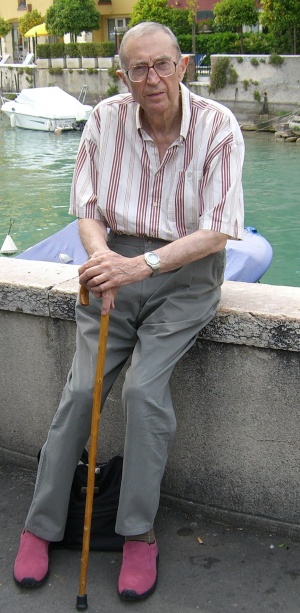Antony Grey
Campaigns
In 1958, he began volunteering for the Homosexual Law Reform Society (HLRS), becoming its Honorary Treasurer in 1960, and Secretary of the HLRS and the Albany Trust in 1962. At that time it was thought inappropriate for an openly gay man to hold this position and, also following his mother's request that he should not use the family name and embarrass his father and their family circle in Sheffield, he adopted the pseudonym Antony Grey – chosen as "there are few entirely black-and-white issues in life" [1] – for use in his gay campaigning activities.He campaigned tirelessly for the decriminalisation of gay sex, as advocated in the Wolfenden Report, organising support for the various attempts at law reform, culminating in the passing of the Sexual Offences Act 1967. Though it was a major step forward, Grey always regretted the compromises made in getting the act through parliament. In the New Oxford History of England,[2] Sir Brian Harrison observes that "his rare combination of high-serious commitment, shrewd political effectiveness, and total lack of self advertisement was precious indeed" to the campaign for law reform.
In 1970 he became secretary of the Sexual Law Reform Society (successor to the HLRS). He was Director of the Albany Trust from 1971 to 1977. He worked with (and often served on the committees of) a number of voluntary organisations including the National Council for Civil Liberties (now Liberty), the British Association for Counselling and Physiotherapy, the National Association of Voluntary Hostels, the Josephine Butler Society, and the Defence of Literature and the Arts Society. He obtained a diploma in counselling skills from the South West London College in 1981.
In 1998 he was awarded the Pink Paper Lifetime Achievement Award and in 2007 he was elected as Hero of the Year by Stonewall supporters.
Personal life
He met his partner, Eric Thompson, in 1960 and they lived together until Antony Grey's death fifty years later. In 2008 they became civil partners. They had difficulty finding a place to live together at first, but in 1961 eventually found a flat at 121 Broadhurst Gardens, West Hampstead. This was the road at the other end of which Esmé Langley then lived. Sixty years earlier, Frederick Rolfe (Baron Corvo) had lived at number 69 when he wrote Hadrian the Seventh;[3] and subsequently Laurence Collinson, playwright, transactional analyst, and prominent member of the Gay Liberation Front lived at 123.
Grey suffered from disabling health from November 2004, but nevertheless managed to visit Italy in 2008 with Andrew Lumsden, who described the holiday in his book Souvenirs of Sirmione.[4].
Grey's papers are deposited in the Hall-Carpenter Archives at the London School of Economics.
Publications
Grey's account of the way the law was reformed was published on 27 July 1992 – the 25th anniversary of the day the Sexual Offences Act became law – as Quest for Justice: Towards Homosexual Emancipation, Sinclair-Stevenson, London. ISBN 1-85619-136-2. (It is now available as an e-book: ISBN 978-1-446-43409-3.)
It was followed in 1993 by Speaking of Sex, Cassell, London, ISBN 0-304-32696-8; and in 1997 by Speaking Out: Writings on Sex, Law, Politics, and Society, 1954-95, Cassell, London, ISBN 0-304-33340-9.
In December 2008 he circulated privately to his family and friends a memoir, Personal Tapestry: woven from the memories of A E G Wright (Antony Grey), The One Roof Press, London. This brought together the personal and public sides of his life, and copies are held by the British Library and the libraries of Magdalene College, Cambridge, and the London School of Economics.
In his later years he blogged as "Anticant": see http://antarena.blogspot.co.uk/
Obituaries
Obituaries in the main-stream press included those in The Times on 5 May 2010 (page 62) and in the Guardian on 4 June 2010 (page 36).[5]
For the gay press see those in Pink News,[6] [7]
The entry in the Oxford Dictionary of National Biography is under his real name.[8]
Other sources include Therapy Today [9] and the BBC's Last Word.[10]
References
- ↑ Personal Tapestry, 2008, pages 110 and 116
- ↑ Seeking a Role: The United Kingdom 1951-1970, Clarendon Press, Oxford, 2009, page 243
- ↑ The Pink Plaque Guide to London, <Michael Elliman and Frederick Poll, 1986, page 169
- ↑ Souvenirs of Sirmione with drawings by David Shelton, One Roof Press, 2010 ISBN 978-0-9535824-5-7, pages 65-89
- ↑ http://www.theguardian.com/world/2010/jun/03/antony-grey-obituary
- ↑ http://www.pinknews.co.uk/2010/05/05/comment-peter-tatchell-pays-tribute-to-a-giant-of-the-gay-movement/
- ↑ http://www.pinknews.co.uk/2010/05/04/first-gay-rights-activist-antony-grey-dies-aged-82/
- ↑ http://www.oxforddnb.com/view/article/102784
- ↑ http://www.therapytoday.net/article/show/1963/
- ↑ http://www.bbc.co.uk/programmes/b00s7f9w

